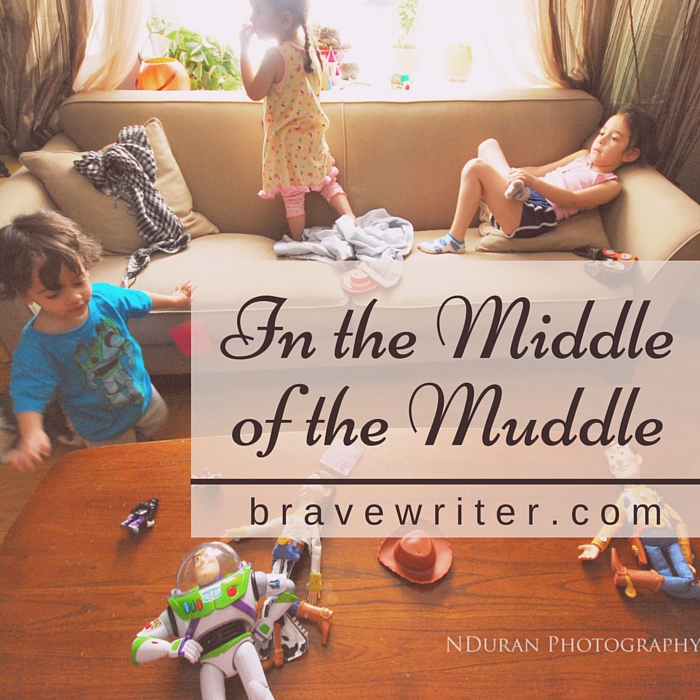In the Middle of the Muddle

I had a conversation with Joanna in private message after I posted about my dislike of the word “obedience” in parenting. It was fruitful. I told her that I like hearing from mothers who are “in the middle of the muddle,” because it’s too easy for mothers with older kids (like me) removed from those toddler years to get a bit glassy-eyed about those struggles.
Here’s one of her comments:
“You’re right, I am in the “middle of the muddle” (I like that) — I have five kids, 3-14 (straddling preschool to 8th grade). I think you do an amazing job “remembering” motherhood, but yes… perhaps the earliest years are pleasantly fuzzy, those years when any mom will tell you that a battle of wills is just par for the course. It’s being patient and empathetic in the midst of it that makes the difference, I think. Tonight, in our house, it was “I want to go bed without brushing my teeth.” Well, it’s not a matter of impossibility, danger or hurting someone else… but the answer is still “no” and I didn’t feel badly about that. There was a short melt-down before he came around (this time the tactic was distraction… Blueberries for Sal awaits, hurry!).
“This is the thing… if I thought that his meltdown was evidence that I hadn’t adequately built a bridge of trust, I would feel condemned — just as condemned as if I felt it was due to my unfaithfulness with “the rod.” I think part of sensible little-kid parenting is just embracing that sometimes (lots of times, because preschoolers excel at making requests/demands) you have to say no, that sometimes your sweetheart will be angry/devastated as a result, that sometimes your wills will clash, but that at the end of the day, love can win and you can come out friends. I love the vision you communicate of coming alongside, of coaching, of understanding and empathizing and saying “yes.” I think it works with older kids and I think it works with schooling. I’m just concerned that it has the potential to create more condemnation when applied (without qualification) to little ones — and I know that’s the farthest thing from your heart.”
I responded to her and want to develop those thoughts.
The key is being mindful and attentive.
I don’t know what you’re like in your home, but what you share here is careful and kind. I agree about the love covering the “no’s.”
One of the things I had to learn (as a highly empathetic mother) was how to support a child in taking greater and greater responsibility. What happens for less empathetic parents is they have to learn how to let go of more and more control.
These are the two axes of mothering—either too much “control” or too much “understanding.”
One of the tricky parts of reading about parenting is the tendency of all the advocates of any one style to act as though a “pure” system will cover all personalities and family dynamics. That turns out not to be true.
What works is to be attentive, to be willing to be wrong, to trust your hunches, to at times let things go (after a day at Disneyland with a burnt out child, skipping the toothbrushing is not a big deal one night), to support consistent practice to develop a habit (expecting toothbrushing most every night and finding a way to help that happen)… Parents offer strength (the backbone of good practices) and tenderness (the compassion for childishness and the perspective of maturity).
That balance is one that gets tweaked throughout childhood.
I like to recommend that everyone start with compassion—getting behind the eyes of the child to see the world as that child is currently seeing it. This takes a pause – you have to stop your own racing thoughts to enter into that empty space of observation, without prejudgment.
Once you are there, it’s easier to see what the child needs and what your role should be. If your heart is pounding and you feel anger rising, you are not there yet.
But even when you are being the backbone on behalf of a child who is struggling to take ownership of his responsibilities (no matter how big or small these are), you can be kind.
“We’re going to register for the ACT test now. I’m standing here until you open the browser and I see you logging in.”
That’s different than anger shouted from another room:
“Hey I told you six times to register for the ACT. The deadline is today. I’m not paying for that late fee. It will come out of your paycheck. Now stop that darned game and register!”
Empathy helps you to keep your attitude in check—to realize that childishness (even in big kids!) runs against emerging personal responsibility. You can remember this feeling, if you tap into it. That helps you determine how you will support the growth necessary without caving (“Here, I’ll do it for you”) versus punishment (“You can’t have the car this weekend if you don’t do it”).
Even small children benefit from this kind of empathy + backbone strategy.
“Toothbrushing happens every night. Sometimes we’re going to go into the bathroom singing and laughing and sometimes I may have to carry you in. But I promise to be gentle with your teeth and as soon as you get the hang of it, you can do it all by yourself.”
These ideas all factor heavily into both homeschooling and the teaching of writing, by the way.



















[…] you are in the middle of the muddle (five kids under 9, all under foot), it doesn’t seem possible that you will one day emerge as […]